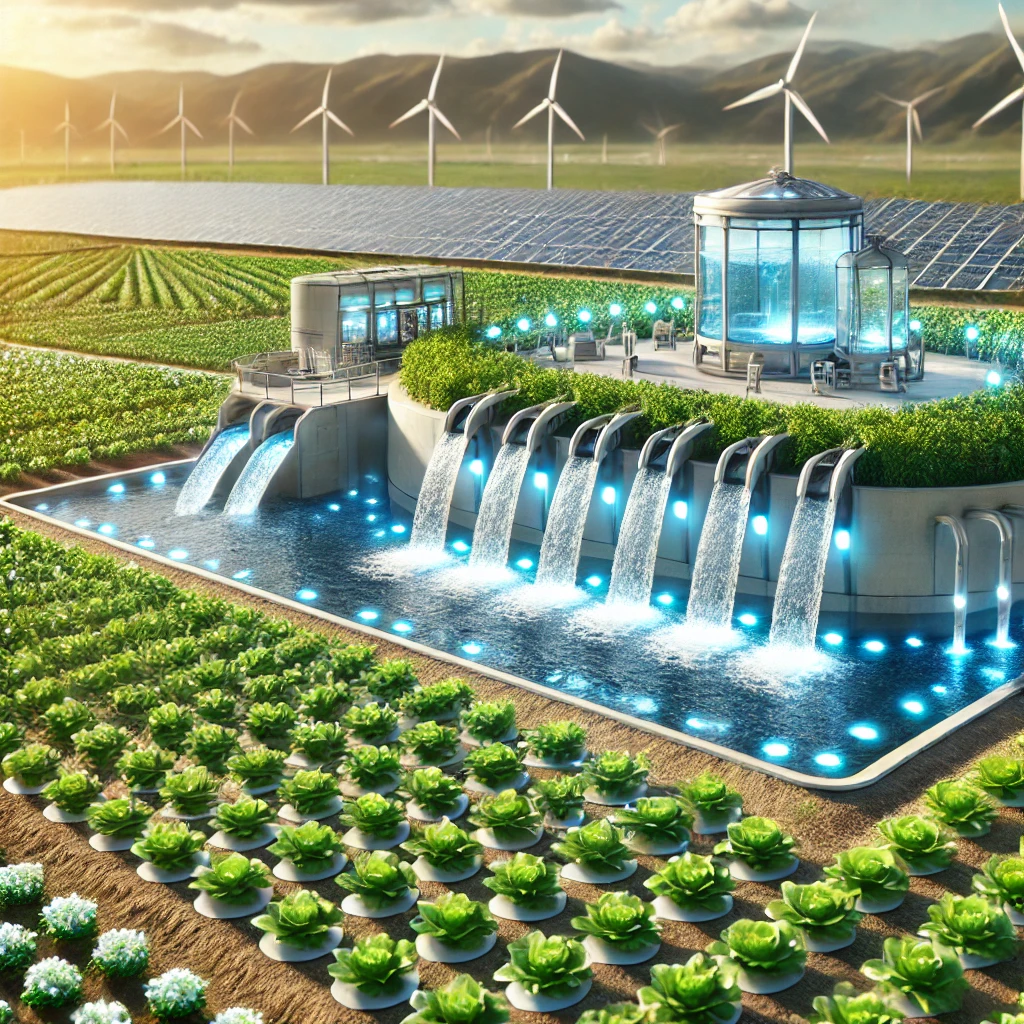Introduction
Imagine a world where the arid deserts bloom with crops and once barren lands thrive with greenery. This vision can become a reality through the innovative use of desalination technology for agriculture. With water scarcity becoming a pressing global issue, particularly in regions with dry climates, desalination presents a promising solution. This startup idea focuses on harnessing desalination technology to provide a sustainable water source for agriculture, addressing one of the most critical challenges of our time.
Market Analysis
Overview of the Current Market
The global water desalination market is experiencing significant growth, driven by increasing water scarcity and the need for sustainable water management solutions. According to a report by Global Market Insights, the desalination market size exceeded $14 billion in 2020 and is projected to grow at a compound annual growth rate (CAGR) of over 9% from 2021 to 2027.
Trends and Potential Opportunities
- Rising Water Scarcity: With climate change exacerbating water shortages, particularly in agricultural regions, there is an urgent need for alternative water sources.
- Technological Advancements: Innovations in desalination technology, such as reverse osmosis and solar desalination, are making the process more efficient and cost-effective.
- Government Initiatives: Many governments are investing in desalination projects to ensure water security, creating a favorable environment for new startups.
- Sustainable Agriculture: There is a growing demand for sustainable agricultural practices, which includes the use of desalinated water to reduce reliance on freshwater sources.
Unique Value Proposition
What Makes This Startup Idea Unique
Our desalination for agriculture startup stands out by integrating cutting-edge desalination technology with advanced agricultural practices. Here’s what sets us apart:
- Cost-Effective Solutions: By leveraging solar-powered desalination and energy-efficient technologies, we reduce operational costs, making it affordable for farmers.
- Sustainability: Our approach minimizes environmental impact by utilizing renewable energy sources and reducing the carbon footprint of water production.
- Scalability: Our modular systems can be scaled to meet the needs of small farms to large agricultural operations, ensuring flexibility and adaptability.
- Community Impact: By providing a reliable water source, we empower local communities, improve food security, and support economic development.
Business Model
Revenue Streams and Monetization Strategies
- Subscription Model: Farmers subscribe to our desalination services, paying a monthly fee based on the volume of water required.
- Equipment Sales: Selling desalination units to larger agricultural enterprises, with ongoing maintenance and support contracts.
- Consulting Services: Offering expertise in water management and sustainable agricultural practices to optimize the use of desalinated water.
- Grants and Subsidies: Partnering with government agencies and NGOs to secure funding and subsidies for implementing desalination projects.
Target Audience
Identifying the Target Audience and Their Needs
- Small to Medium-Sized Farmers: Seeking reliable and affordable water sources to sustain their crops and livestock.
- Large Agricultural Enterprises: Looking for scalable solutions to address water scarcity and improve sustainability.
- Government Agencies: Interested in promoting sustainable agriculture and water security through innovative technologies.
- NGOs and Non-Profits: Focused on supporting rural communities and ensuring food security in water-scarce regions.
Development and Execution
Steps to Develop and Execute the Startup Idea
- Research and Development: Invest in R&D to refine desalination technology and integrate it with agricultural systems.
- Prototype Development: Create prototypes of desalination units and test them in real-world agricultural settings.
- Partnerships: Collaborate with technology providers, agricultural experts, and government agencies to ensure comprehensive solutions.
- Pilot Projects: Launch pilot projects in targeted regions to demonstrate the effectiveness and scalability of the technology.
- Commercialization: Scale up production and expand marketing efforts to reach a broader audience.
- Ongoing Support: Provide continuous support and maintenance services to ensure the longevity and efficiency of the systems.
Funding and Investment
Potential Funding Sources and Investment Opportunities
- Venture Capital: Attract venture capitalists interested in sustainable agriculture and water technology.
- Government Grants: Apply for grants and subsidies aimed at promoting water security and sustainable agriculture.
- Crowdfunding: Launch crowdfunding campaigns to raise awareness and secure initial funding from the public.
- Impact Investors: Engage with impact investors who prioritize environmental and social impact alongside financial returns.
Financial Projections
Our financial projections indicate a strong growth trajectory, with anticipated revenue reaching $10 million within the first five years, driven by subscription fees, equipment sales, and consulting services.
Challenges and Risks
Potential Challenges and Strategies to Mitigate Them
- High Initial Costs: Mitigate by securing grants and subsidies, and offering financing options to farmers.
- Technical Challenges: Address through continuous R&D and partnerships with technology experts.
- Regulatory Hurdles: Stay compliant with local regulations by working closely with government agencies.
- Market Adoption: Increase market adoption through education, demonstration projects, and building trust with early adopters.
Success Stories and Case Studies
Examples of Similar Successful Startups
- Watergen: A startup that creates water from air, successfully implemented in various regions, demonstrating the potential for innovative water solutions.
- IDE Technologies: A leading desalination company providing solutions globally, showcasing the scalability and impact of desalination technology.
Relevant Case Studies
- Israel’s Agricultural Success: Israel has become a leader in desalination and agricultural innovation, transforming arid land into productive farmland.
- California’s Desalination Projects: Several projects in California provide valuable insights into the implementation and impact of desalination for agriculture.
Call-to-Action
We invite you to join us in revolutionizing agriculture with desalination technology. Whether you’re a farmer seeking sustainable solutions, an investor looking for impactful opportunities, or a technology partner, your collaboration can make a difference. Share this startup idea, explore partnership opportunities, and let’s create a sustainable future for agriculture together.
Mobile Optimization
Our content is optimized for mobile devices, ensuring a seamless reading experience on smartphones and tablets. Fast loading times and responsive design guarantee accessibility for all users, regardless of their device.
By integrating innovative desalination technology with sustainable agricultural practices, our startup aims to address the pressing issue of water scarcity and transform the future of agriculture. Join us on this journey to create a greener, more sustainable world.

